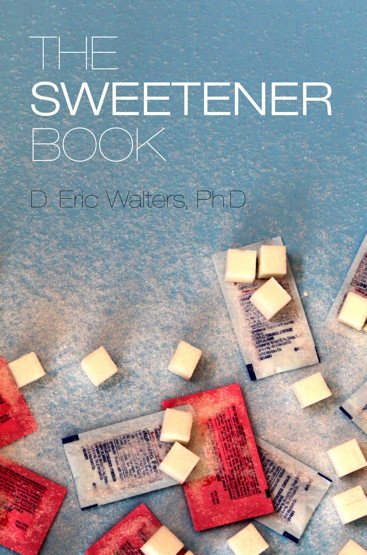LATEST BLOG: Is It Sugar Or Not?

The Sweetener Book
ISBN 978-0989109208
D. Eric Walters, Ph.D.
This book provides objective, scientific information about a wide range of sweeteners, in a form that is accessible to consumers. The website is a preview of the information available.
Order the book!
You can order the book now at:
About the book:
A complete consumer's guide to the world of sweeteners.
You want to make the right choice for you and your family...
But which sweetener is really the best? In reality, there is not a one-size-fits-all answer to this question. The right answer depends on a number of factors, because each sweetener has its pros and cons. Which sweeteners have a low glycemic index? Which ones can upset your digestive system? Which one can aggravate high blood pressure? Which ones work best for baking? This book gives you the science-based information you need to make the sweetener choice that's best for you and your family.
This book tells you the advantages and disadvantages of sucrose, brown sugar, turbinado, molasses, fructose, glucose, lactose, isomaltulose, corn syrup, high fructose corn syrup (HFCS), honey, agave nectar, sorbitol, isomalt, lactitol, maltitol, mannitol, xylitol, inulin, fructooligosaccharides, tagatos, erythritol, glycerol, acesulfame, aspartame, neohesperidin dihydrochalcone, neotame, saccharin, sucralose, cyclamate, alitame, stevia (stevioside and rebaudioside), luo han guo (mogrosides), glycyrrhizin, thaumatin, brazzein, monellin, mabinlin, curculin, and miraculin. It tells you about the taste quality, calories, glycemic index, stability, and safety of each of these sweeteners.
Sugars
Sugars are simple carbohydrates. They provide 4 calories per gram. Sucrose (table sugar) is the standard against which all other sweeteners are judged. Glucose, fructose, and high fructose corn syrup also fall into this group.
Sugar alcohols
Sugar alcohols (also called polyols) are chemically related to sugars. This group includes sorbitol, xylitol, mannitol, and several others. They are only partly absorbed and metabolized, so they provide fewer calories--usually 1-3 calories per gram. Eating large quantities of polyols can cause digestive system upset.
High potency sweeteners
High potency sweeteners are substances that taste hundreds or thousands of times sweeter than sugar. This allows for much smaller quantities to be used. Aspartame, sucralose, saccharin, acesulfame, and several others are in this group.
Natural sweeteners
These are plant-derived substances that have high sweetness potency. Stevia, rebaudioside, and luo han guo are the best known sweeteners in this group.
 Follow @SweetenerBook
Follow @SweetenerBook